Contents
The fact that it is customary to whitewash tree trunks in the spring is known even to those who have never dealt with a personal plot. But not every gardener knows that in addition to spring processing, it is also necessary to carry out autumn processing. Whitewashing apple trees in autumn is no less important than in spring. It has a protective function, protecting tree trunks from hordes of insects and pests, and also protects the bark from sunburn. In order for apple trees to be less susceptible to diseases and bear fruit well, they need help.
Why whiten apple trees in autumn
Spring whitewashing is a common thing. And everyone knows that trees are processed during this period in order to protect against the destructive actions of numerous insects and pests. Whitewashing apple trees in autumn has the following goals:
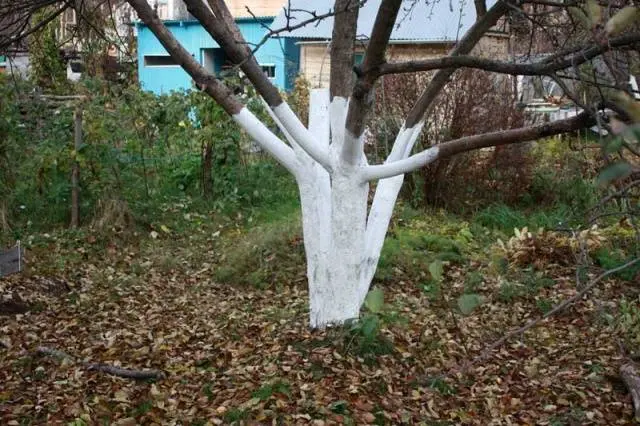
- Protection against fungi and spores of various etiologies;
- Destruction of insect larvae;
- Sunburn protection;
- Frost protection;
- Protection against small rodents, hares.
In autumn, all insects seek shelter for the winter. The tree bark becomes a wonderful haven for them. Untreated and unprotected apple bark is an open gate not only for insects, but also for infection, fungi and spores. If the trees are not processed, then after the decrease in yield, the quick death of the fruit tree can also be expected.
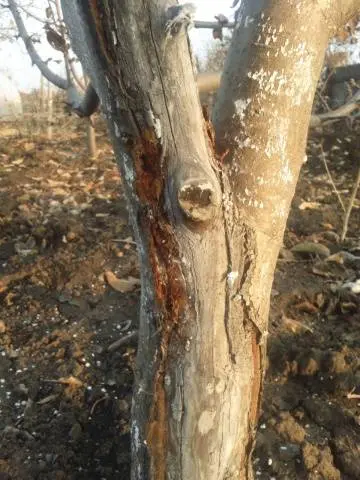
Sharp temperature changes, sudden winter thaws, a large difference between night and day temperatures – it is impossible to predict what else apple trees have to endure in a few months of winter. Sunburns are not uncommon. You can get this defeat even in winter, when the bright sun heats the trees. If there are even small dark brown or black areas of bark on the bark, then it is in this place that the apple tree will get burned. And the white color reflects direct rays like a mirror. Thus, in whitewashed apple trees, the risk of damage is reduced significantly.
Many rodents, including hares, are not averse to feasting on tree bark in winter. And apple trees are no exception. Unprotected trees will attract them first.
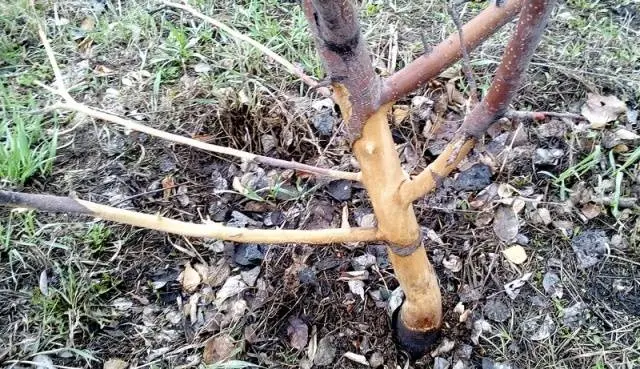
If you are faced with a rhetorical question: when is it better to whiten apple trees, in autumn or spring, the answer will be unequivocal. Fruit trees need protection all year round, which means that apple trees need to be whitewashed at least twice a year.
Fruit trees begin to prepare for winter in the second half of September. It is necessary to finish the whitewashing of apple trees before the onset of frost.
Where to begin
Just applying lime or a whitening composition to the trunks does not mean at all that you have fully prepared and whitewashed the trees for the cold. Immediately before whitewashing apple trees in the fall, it is necessary to carry out a number of preparatory work:
- Trunk cleaning;
- Disinfection;
- Seal of wounds and cracks.
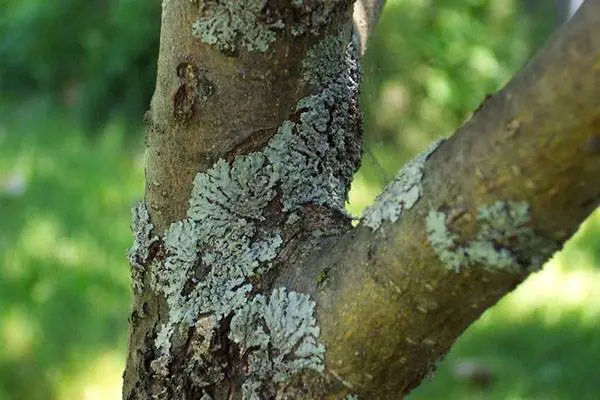
And only after that it will be possible to start whitewashing. All work, including the whitewashing process itself, requires a lot of time and effort. It is advisable to maintain the allotted time between stages. And to finish all the work in the garden must be before the onset of frost. Therefore, start processing apple trees in advance. Early to mid-October is the ideal time to whiten apple trees in the fall.
Inspection and cleaning of trunks
Each crack on the trunk of an apple tree, in fact, is a breeding ground for all sorts of diseases. To prevent possible infection with scab or fruit rot, it is necessary to inspect and thoroughly clean the trunks.
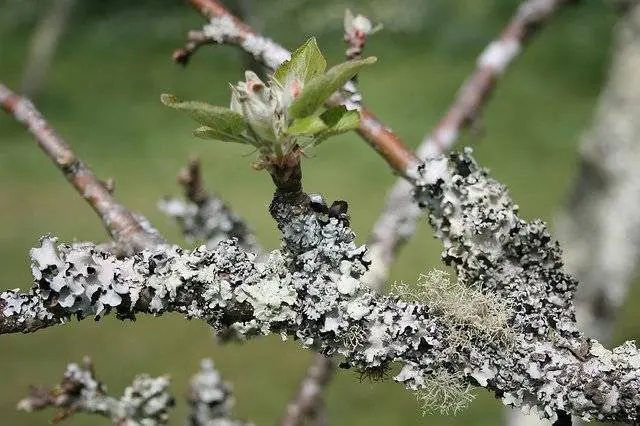
To do this, you will need: a plastic spatula and a film or tarp. Iron brushes, spatulas and knives are completely unsuitable for cleaning – they can injure trees. Spread the material around the apple tree in order to subsequently collect all the cleaned debris. It is undesirable to leave it under a tree.
Please note that small pieces of bark may fly off during operation. Therefore, take protective measures: wear special glasses and gloves. Inspect the apple tree for cracks, damage and the slightest holes. All of them need to be carefully cleaned, removing the layer that is easily removed. Remove pieces of moss, lichen, exfoliated pieces of bark from the trunks.
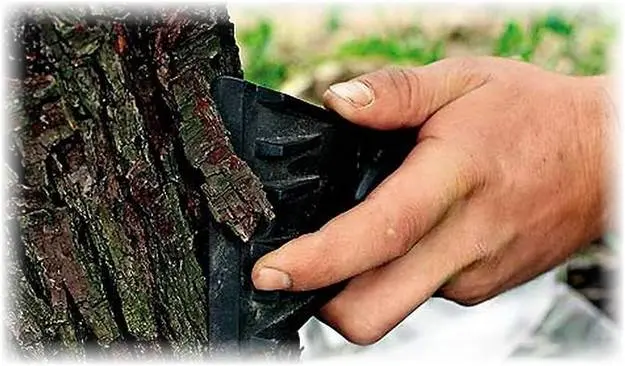
To clean narrow, hard-to-reach places, use a wooden knife or a thin piece of wood. When you have completely cleaned the apple trees, collect all, even small, pieces of bark. You can, of course, just remove the garbage from the garden. But to prevent the spread of pathogens, it is better to burn it.
Stem disinfection
After cleaning the apple tree, it is imperative to disinfect it in order to destroy all insects.
It is necessary to carry out disinfection measures in dry, calm weather. Pay attention to the weather forecast – precipitation in the next 2-3 days after processing is undesirable. They will simply wash away all your hard work. Remember to take protective measures: wear plastic goggles, a respirator and rubber gloves.
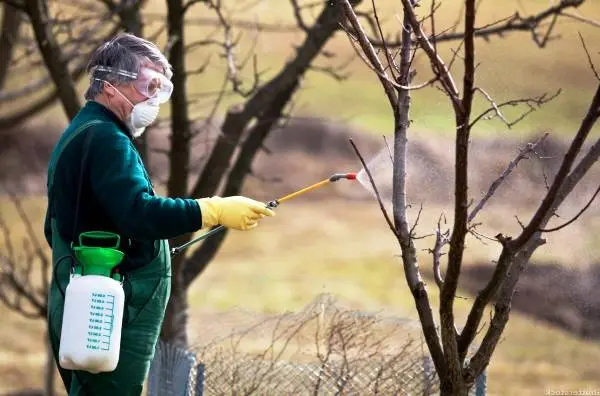
As a disinfectant, you can use:
- Bordeaux mixture;
- HOM;
- Oxyhom.
Spray the trunk of an apple tree and skeletal branches to a height of 1,5-2 meters from the ground. The composition must be applied in a very thin layer. It is best to use a reinforced atomizer in this case. The main thing is that during processing the disinfectant should be evenly applied to the trunks, and not dripping.
Many gardeners use a soap-ash solution to disinfect fruit trees. In addition to the fact that it does not require financial costs, it can rightfully be called universal. Ash perfectly disinfects, and at the same time feeds apple trees with potassium and phosphorus.
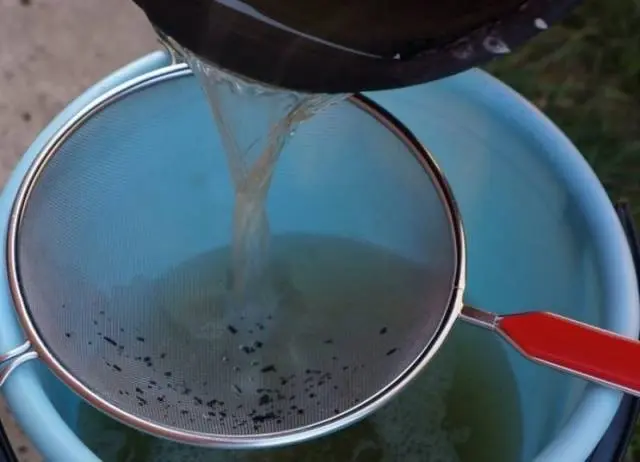
Laundry soap in the amount of 50 g to prepare the solution, grate on a coarse grater. The water should be very hot, almost boiling water. In a bucket of water, add grated soap and ash in an amount of 2,5-3 kg. Stir the mixture well until the soap is completely dissolved. Let the solution cool down.
When the solution has cooled, take a small bundle of hay or old rags that you don’t need. Dip in the mixture and apply to the bark of the apple tree. In this case, you can not save, but practically wash the trunks with it to the height that your hand reaches.
After processing, give the trees a little rest. The next stage of work can be started at least 5-7 days after disinfection.
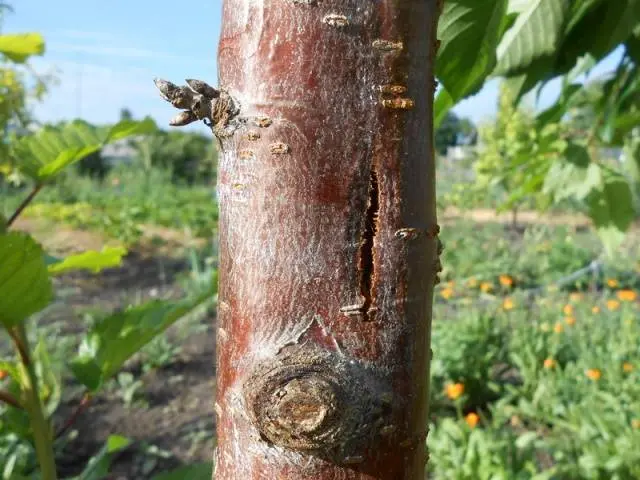
Sealing of cracks and wounds
It is imperative to close up all cracks and wounds on apple trees. They are not only a haven for pests. Pathogenic bacteria and microorganisms quickly penetrate through open wounds under the cortex.
It is very easy to prepare a mixture for sealing wounds. You will need clay and manure in a 2:1 ratio and some straw dust. Dilute this composition with a small amount of water and mix thoroughly. Gently cover all wounds, cracks, damage on apple trees with a clay talker.
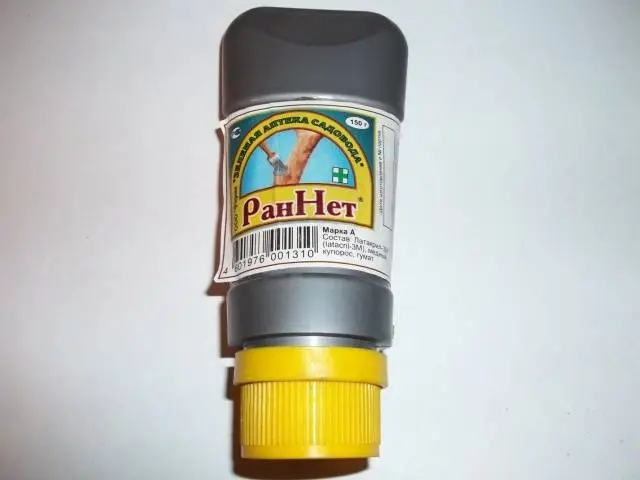
If you do not have the necessary ingredients at hand, you can use any putty for fruit trees. A wide range of these products is presented in specialized stores. RanNet pasta received great recognition among gardeners. They are also perfect for processing open cuts after autumn pruning of apple trees.
After you have repaired all the damage, let them dry well. It is not recommended to start whitewashing apple trees earlier than 1-1,5 weeks after putty.
Compositions for whitewashing
As it was written above, the compositions for whitewashing apple trees may differ. Why? Each solution performs its function:
- Destruction of insects and their larvae;
- Sunburn protection;
- Protection against hares and small rodents.
It’s up to you to decide which one to use.
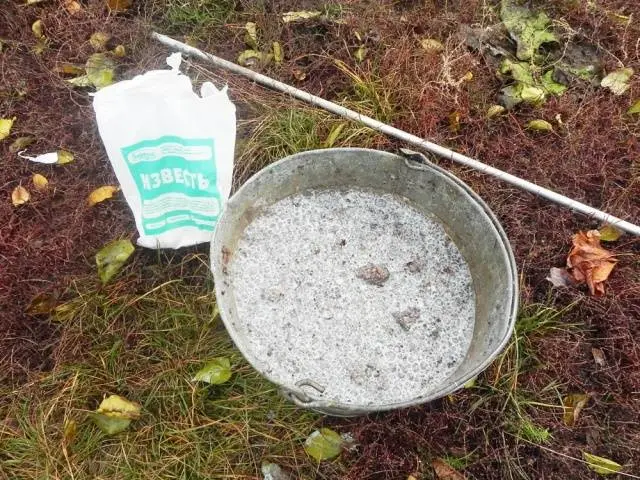
Standard composition for whitewashing
The main function of this whitening composition is the destruction of insects and the protection of apple trees from their harmful effects. For kneading you will need: quicklime, clay, water.
The ratio of lime and clay should be 2:1.
First of all, you need to extinguish the lime with water. When the solution has cooled, add the clay and knead the composition well. The consistency of the bleaching solution should be like sour cream. Its advantage is that the trunks of apple trees covered with a sufficiently thick layer will be most protected, and it will not be washed away with the first rain.
In the absence of clay, it can be replaced with glue. Casein or wood glue is perfect as an additive for whitewashing apple trees.
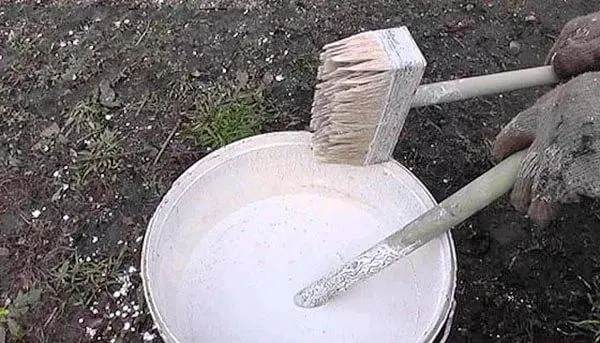
Composition for protecting trunks from burns
This whitening composition has good reflectivity. The rays of the sun will not harm your apple trees if they are treated with the following composition:
- Water – 2 liters;
- PVA glue (or stationery) – 2 tbsp. l.;
- Lime “fluffy” – 300 gr.
If necessary, glue can be replaced by 100 gr. milk.
All ingredients must be thoroughly mixed until smooth.
If you add to this solution 1 tbsp. l. DDT powder and 1 tbsp. l. iron or copper sulfate, then the mixture will acquire an additional function. It will protect apple trees from various diseases and fungi.
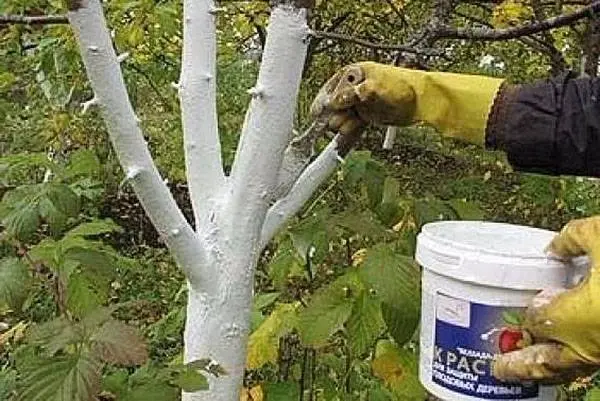
Solution for protection against rodents
The composition for whitewashing apple trees, prepared according to this recipe, is rather universal. Firstly, it destroys pests and their numerous offspring. Secondly, thanks to him, you can carry out timely prevention against putrefactive diseases.
- PVA glue and PVA dispersion in the ratio 1:1. One serving – 0,5-1 glass.
- Iron or copper sulfate – 2 tbsp. l.
- Water – 2 liters.
With the addition of a few drops of “Knockdown” or a small portion of Creolin, it will protect apple trees from the invasion of small rodents and hares, destroy all fungal spores, as well as ant eggs laid under the bark and in microcracks.
The solution must be thoroughly mixed. Leave it for 20-30 minutes and stir again. Now you can start whitewashing apple trees.
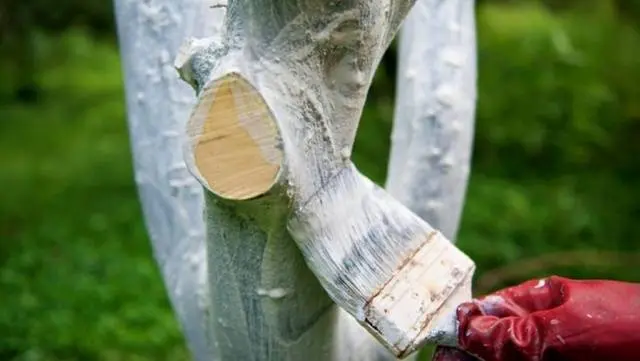
Whitewash trunks
For whitewashing apple trees, it is important to choose the right brush. It is desirable that the width of the brush is approximately equal to the width of the trunk. In this case, there will be no overspending of the whitewash solution, and the work will be done many times faster. For convenience, you can use the spray gun.
You need to whiten apple trees correctly, starting from the bottom, gradually rising up. Please note that it is necessary to whitewash not only the trunks, but also the skeletal branches up to a height of 25-30 cm from the base.
About why to whiten apple trees in the fall and how to do it correctly, the author of the video will tell:
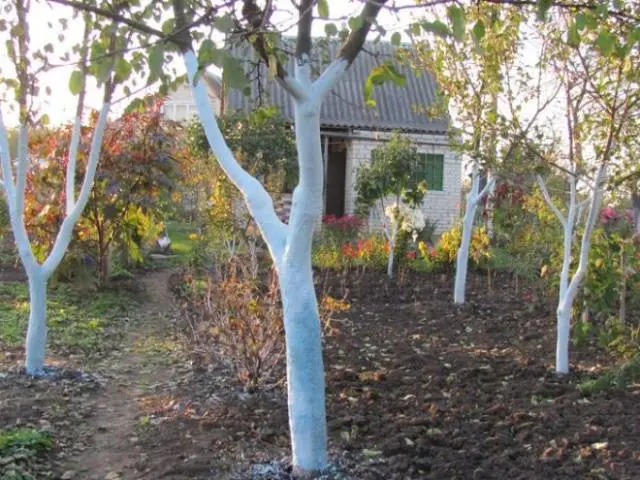
Conclusion
All work on cleaning and whitewashing apple trees in the fall must be carried out annually. With regular care, your trees will always be strong and healthy, which will immediately affect the yield and taste of the fruit. Moreover, all of the above activities will significantly extend the life of your trees.









